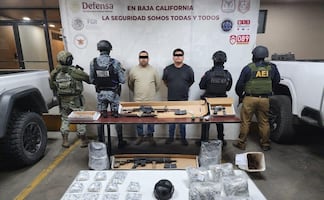Mexican researchers have proposed to design a molecular method to help with the diagnosis of COVID-19 for they think that only when more tests are done among the population, it will be known if the cases have decreased and hence, lift the physical distancing measures in the right moment.
The Advanced Genomics Unit – National Genomics Laboratory for Biodiversity (UGA-Langebio) , led by Luis Gabriel Brieba de Castro , proposed the creation of a design that works through the use of “robotic process automation (RPA), a method that has the ability to replicate a fragment of the DNA that needs to be analyzed and that, in addition, is much cheaper compared to other methods available on the market.
Recommended: Mexico authorizes seven serology tests for COVID-19 antibodies
“Molecular diagnosis with RPA technology is a method that allows detecting the genome of the SARS-CoV-2 virus , through the exponential amplification of nucleic acid without the need for sophisticated and expensive machines ; the idea is to carry out the tests in rural communities or even in the kitchen of a camp to detect infections” as explained by Brieba de Castro through a statement.
The experts said that after a person has undergone the test, in case of being positive, and according to the seriousness of the symptoms they show, they will have the opportunity to receive medical care or isolate themselves at home to avoid spreading the disease; “moreover, it would be a good option to detect asymptomatic cases of people infected with the virus, which is calculated to represent 50% of the population,” said CINVESTAV .
On the other hand, it is calculated that the individual test would have an approximate cost of MXN $250 and would be available to anyone with a response time of half an hour; it could be done in any clinic or at home for, as the researchers explained, “this test, instead of needing very sophisticated equipment, only requires four enzymes of thermophilic organisms,” which are bacterias that resist relatively high temperatures, to which they are submitted through this kind of tests.
Recommended: UNAM to start animal testing on COVID-19 vaccine
The technology proposed by the investigation group establishes a protocol that is able to perform cycles of a single temperature without the need to use trained personnel or high investments . Therefore, Brieba de Castro mentioned that they hope “that this methodology could have a special impact in rural areas where the conditions of the health system are precarious and do not have access to technologies that involve high costs.”
Regarding the time that would take to obtain the tests, the researcher said that it could be ready within six months , although it is hard to say for it depends on the availability of funds and donations . Gabriel Brieba de Castro said that “Mexico has trained personnel with answers and proposals in front of the crisis ; it only needs economic support ; if we don’t get it, we’ll see how to finalize the project because the objective is to see this work mirrored as a direct benefit for society.”
Recommended: IPN scientists develop rapid diagnostic tests for COVID-19
mp
Noticias según tus intereses
[Publicidad]
[Publicidad]














